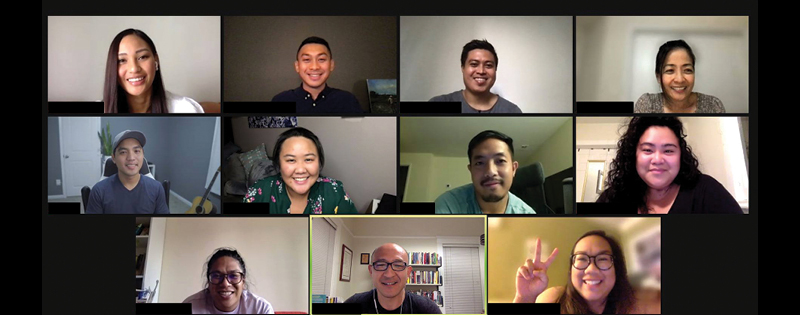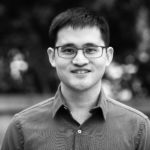
“There’s a need that has to be addressed,” says Gabriel Jay Catanus, director of the Filipino American Ministry Initiative (FAMI), recently launched by Fuller’s Asian American Center (AAC). “In the United States, there are more than 4 million Filipino Americans, and 90 percent of them identify as Christian. We need to serve these communities.”
Daniel D. Lee, AAC’s academic dean, explains that the new initiative—and hopefully others that may eventually follow—has been a long time coming. He says, “The Asian American context itself is very diverse, so from the very beginning, when we started the center, the question was, ‘How do we do this without ending up with the problem of ethnic monopolizing?’” He explains that in most spaces, including seminary and church contexts, East Asian monopolizing can be a dominant factor, creating the need for intentional steps to highlight Southeast and South Asians.
The initiative is the first of its kind in the country, as far as Daniel and Jay understand. And in its inaugural year, FAMI already has plans for producing a special season of AAC’s Centering podcast, hosting events during Filipino American History Month, rolling out formation groups, creating a course on FULLER Equip, and more. A taste of these offerings was made available last summer, when Jay and Daniel taught an online class, Filipino American Context and Ministry, which engaged “the social, political, and cultural aspects of the Filipino American context for the task of constructing local ministries.” Eleanor Baylon, a PsyD candidate who participated in the class and is now serving as FAMI’s director of formation, says there was power in simply being present with one another in that space—in knowing they were not alone.
“It was healing,” says Eleanor, who hopes FAMI’s work will contribute to combating a colonial mentality that has obscured the experience and story of Filipinos and Filipino Americans. Her goal for FAMI, and for its formation groups specifically, is not only to challenge such colonial thought but also to ask what it means to celebrate being Filipino, “not just in our individual selves but in our church communities.”
Daniel says all of this is only the beginning, but “part of what we can do is try to actually become a place where Filipino American students can come and, if nothing else, be seen as Filipino Americans.” Gillian Garcia, AAC’s program assistant, believes we’re on the right track, and she’s hopeful about what’s ahead for the initiative. “I’ve been chatting with other Filipino students,” she says, “and we agree that it’s such a good time to be Filipino and brown at Fuller.”

Jerome Blanco (MDiv ’16), editor in chief of FULLER magazine and Fuller’s senior content editor.
“There’s a need that has to be addressed,” says Gabriel Jay Catanus, director of the Filipino American Ministry Initiative (FAMI), recently launched by Fuller’s Asian American Center (AAC). “In the United States, there are more than 4 million Filipino Americans, and 90 percent of them identify as Christian. We need to serve these communities.”
Daniel D. Lee, AAC’s academic dean, explains that the new initiative—and hopefully others that may eventually follow—has been a long time coming. He says, “The Asian American context itself is very diverse, so from the very beginning, when we started the center, the question was, ‘How do we do this without ending up with the problem of ethnic monopolizing?’” He explains that in most spaces, including seminary and church contexts, East Asian monopolizing can be a dominant factor, creating the need for intentional steps to highlight Southeast and South Asians.
The initiative is the first of its kind in the country, as far as Daniel and Jay understand. And in its inaugural year, FAMI already has plans for producing a special season of AAC’s Centering podcast, hosting events during Filipino American History Month, rolling out formation groups, creating a course on FULLER Equip, and more. A taste of these offerings was made available last summer, when Jay and Daniel taught an online class, Filipino American Context and Ministry, which engaged “the social, political, and cultural aspects of the Filipino American context for the task of constructing local ministries.” Eleanor Baylon, a PsyD candidate who participated in the class and is now serving as FAMI’s director of formation, says there was power in simply being present with one another in that space—in knowing they were not alone.
“It was healing,” says Eleanor, who hopes FAMI’s work will contribute to combating a colonial mentality that has obscured the experience and story of Filipinos and Filipino Americans. Her goal for FAMI, and for its formation groups specifically, is not only to challenge such colonial thought but also to ask what it means to celebrate being Filipino, “not just in our individual selves but in our church communities.”
Daniel says all of this is only the beginning, but “part of what we can do is try to actually become a place where Filipino American students can come and, if nothing else, be seen as Filipino Americans.” Gillian Garcia, AAC’s program assistant, believes we’re on the right track, and she’s hopeful about what’s ahead for the initiative. “I’ve been chatting with other Filipino students,” she says, “and we agree that it’s such a good time to be Filipino and brown at Fuller.”
Jerome Blanco (MDiv ’16), editor in chief of FULLER magazine and Fuller’s senior content editor.
This issue of FULLER magazine engages with this question of justice—of what it looks like for wrong to be made right, and of how we are to be part of this work.